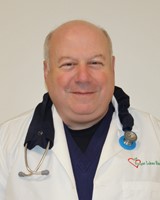Reflections on 30 Years in Emergency Medicine
 Before he became a physician, Jack Davidoff, MD, an Emergency Medicine physician at Finger Lakes Health in Geneva, NY, wanted to be a veterinarian. While finishing high school, he began working with local ambulance services and eventually became an EMT. He was soon accepted to veterinary school, but, realizing that what he really wanted to do was practice medicine, he turned it down. Now, after 30 years as an emergency medicine physician, he looks back on his career with a sense of satisfaction and accomplishment and at times disappointment.
Before he became a physician, Jack Davidoff, MD, an Emergency Medicine physician at Finger Lakes Health in Geneva, NY, wanted to be a veterinarian. While finishing high school, he began working with local ambulance services and eventually became an EMT. He was soon accepted to veterinary school, but, realizing that what he really wanted to do was practice medicine, he turned it down. Now, after 30 years as an emergency medicine physician, he looks back on his career with a sense of satisfaction and accomplishment and at times disappointment.
Dr. Davidoff reserves a lot of praise for his residency training in family medicine. (The program allowed for training in pediatrics and geriatrics and even subspecialties such as ENT, rheumatology, orthopedics and ophthalmology.) When he started his medical career, he says, regulations were different, permitting him to see far more patients than today’s residents are allowed to see, but he credits the long hours and huge caseload with making him a better doctor. Spending his third year of school in Great Britain gave a different perspective on medicine that he says continues to influence his practice today.
Technology has changed the way physicians practice emergency medicine, he says. For instance, all records used to be on paper, and to get his patients’ lab results, he would have to pore over lines of handwritten information in each lab several times a day. Also, X-rays were all still on film, and to obtain the right X-ray, he would have to sort through several stacks of film. By contrast, in today’s ER, both of these tasks take seconds to complete. However electronic health care records have caused many delays and frustrations and continue to be less efficient in a busy practice.
Because he was not residency-trained in emergency medicine, Dr. Davidoff was ineligible for certification with the American Board of Emergency Medicine (ABEM). Facing limitations to his practice, and with many hospitals requiring their emergency medicine physicians to hold board certification, Dr. Davidoff turned to the Board of Certification in Emergency Medicine (BCEM).
Since earning BCEM certification, Dr. Davidoff has worked at hospitals that are committed to providing quality emergency care and fully recognize the BCEM. Rather than focusing on the business and politics of medicine, BCEM is steadfastly dedicated to the advancement of emergency medicine through exceptional care, research, and education. Backed by the BCEM and his vast ER experience, Dr. Davidoff believes he practices the specialty more successfully and with more expertise than his colleagues who have completed an emergency medicine residency.
Dr. Davidoff has been an educator locally, nationally and even internationally. He has held several positions on national organizations including President of the Air Medical Physicians Association. He has been the Regional EMS Medical Director for 4 counties and numerous EMS and Fire agencies.
Emergency Medicine has changed as have all the other specialties over the past 30 years. Not all the changes are good. Emergency Departments are filling the void as Primary Care becomes scarce in some areas. Substance abuse has increased significantly along with all the medical and social problems associated with such abuse. Violence in the ED has increased. However, there is still a need for Emergency Physicians that work well in these situations.
The ABPS of which the BCEM is a Member Board, would find it hard to disagree. Our highly skilled and accomplished Diplomates practice emergency medicine at respected hospitals across the United States, as well as Canada and Puerto Rico. Through the BCEM, we offer certification in emergency medicine to qualified physicians who have completed a primary care residency. To learn about the BCEM’s eligibility requirements, contact the ABPS today.






